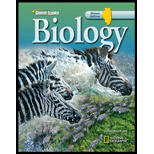
Concept explainers
Introduction:
A cell grows until it reaches its size limit, then it either stops growing or divides. Most cells undergo division. Cell division helps a cell to reproduce and makes the organism grow and heal certain injuries. Cells reproduce by a cycle of growing and dividing called the cell cycle. Prokaryotic cells reproduce by a method called binary fission.
Answer to Problem 7A
Correct answer :
The correct answer is option D. Cell cycle
Explanation of Solution
Explanation/justification for the correct answer:
OptionD. Cell cycle- The sequence of events in the life of a cell is called the cell cycle. It includes cellular growth and cell division. There are three main stages of a cell cycle; interphase, mitosis and cytokinesis.
Interphase- This is the first stage in which a cell spends most of the time. It is the stage in which a cell grows, carries out cellular activities and replicates.
The next stage is mitosis in which cell’s nucleus and nuclear material divides.
The last stage is cytokinesis in which the cytoplasm of the cell divided creating a new cell.
Explanation for incorrect answer:
Option A. chromatin- Chromosomes are made up of chromatin, a substance consisting of DNA and protein. Long molecules of DNA are packed in chromatin in a more compact form that helps it to fit within the nucleus. Chromatin does not refer to cell growth and cell division. Hence this option is incorrect.
Option B. cytoplasm- Cytoplasm is a thick gel like liquid inside a cell that is enclosed by plasma membrane. It contains water, salts and proteins. Cell organelles are present in the cytoplasm. Everything inside the cell and outside the nucleus is called cytoplasm. Hence this option is incorrect.
Option C. mitosis- The second stage in cell cycle is mitosis during which only nucleus divides. There is no cellular growth and cell division during this stage. Hence this option is incorrect.
Chapter 9 Solutions
Biology Illinois Edition (Glencoe Science)
Additional Science Textbook Solutions
Anatomy & Physiology (6th Edition)
Campbell Essential Biology with Physiology (5th Edition)
Microbiology with Diseases by Body System (5th Edition)
Campbell Essential Biology (7th Edition)
Becker's World of the Cell (9th Edition)
Campbell Biology: Concepts & Connections (8th Edition)
 Human Anatomy & Physiology (11th Edition)BiologyISBN:9780134580999Author:Elaine N. Marieb, Katja N. HoehnPublisher:PEARSON
Human Anatomy & Physiology (11th Edition)BiologyISBN:9780134580999Author:Elaine N. Marieb, Katja N. HoehnPublisher:PEARSON Biology 2eBiologyISBN:9781947172517Author:Matthew Douglas, Jung Choi, Mary Ann ClarkPublisher:OpenStax
Biology 2eBiologyISBN:9781947172517Author:Matthew Douglas, Jung Choi, Mary Ann ClarkPublisher:OpenStax Anatomy & PhysiologyBiologyISBN:9781259398629Author:McKinley, Michael P., O'loughlin, Valerie Dean, Bidle, Theresa StouterPublisher:Mcgraw Hill Education,
Anatomy & PhysiologyBiologyISBN:9781259398629Author:McKinley, Michael P., O'loughlin, Valerie Dean, Bidle, Theresa StouterPublisher:Mcgraw Hill Education, Molecular Biology of the Cell (Sixth Edition)BiologyISBN:9780815344322Author:Bruce Alberts, Alexander D. Johnson, Julian Lewis, David Morgan, Martin Raff, Keith Roberts, Peter WalterPublisher:W. W. Norton & Company
Molecular Biology of the Cell (Sixth Edition)BiologyISBN:9780815344322Author:Bruce Alberts, Alexander D. Johnson, Julian Lewis, David Morgan, Martin Raff, Keith Roberts, Peter WalterPublisher:W. W. Norton & Company Laboratory Manual For Human Anatomy & PhysiologyBiologyISBN:9781260159363Author:Martin, Terry R., Prentice-craver, CynthiaPublisher:McGraw-Hill Publishing Co.
Laboratory Manual For Human Anatomy & PhysiologyBiologyISBN:9781260159363Author:Martin, Terry R., Prentice-craver, CynthiaPublisher:McGraw-Hill Publishing Co. Inquiry Into Life (16th Edition)BiologyISBN:9781260231700Author:Sylvia S. Mader, Michael WindelspechtPublisher:McGraw Hill Education
Inquiry Into Life (16th Edition)BiologyISBN:9781260231700Author:Sylvia S. Mader, Michael WindelspechtPublisher:McGraw Hill Education





